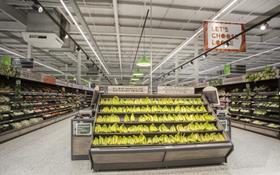
Asda has today (20 October) opened a new sustainability trial store and unveiled a new plastics reduction strategy with a promise that customers will not pay more for greener options.
The UK supermarket said the store in Middleton, Leeds, is designed to help shoppers reduce, reuse and recycle and it estimates the numerous initiatives being trialled in Middleton will save one million pieces of plastic per year.
Asda said it will use the Middleton store to test and learn which elements of its new offer appeal most to customers and can be developed at scale to be potentially rolled out to more locations in 2021.
The supermarket has also launched ‘Greener at Asda Price’ - a national price promise that loose and unwrapped products will not cost more than wrapped equivalents.
The new store includes 53 fresh produce lines in total sold in loose and unwrapped format including 29 new lines such as cauliflowers, mushrooms, apples, cabbages and baby plum tomatoes. In addition, all Asda plants and flowers are sold either unwrapped or with a paper wrapping.
Also featured in the new store are 15refill stations offering customers a selection of more than 30 household staples sold in refillable format.
Roger Burnley, Asda’s CEO and president said: “Today marks an important milestone in our journey as we tackle plastic pollution and help our customers to reduce, re-use and recycle. We have always known that we couldn’t go on this journey alone, so it is fantastic to work in tandem with more than 20 of our partners and suppliers, who have answered the call to test innovative sustainable solutions with us.
“This is an issue that matters greatly to our customers – our own insight tells us that more than 80 per cent believe that supermarkets have a responsibility to reduce the amount of single use plastics in stores. We want to give them the opportunity to live more sustainably by offering them great product choices and value, underpinned by a promise that they won’t pay more for greener options at Asda.
“During the next few months we will listen to customers and colleagues’ feedback on Middleton so we can understand how we can continue to reduce our environmental impacts, whilst continuing to deliver quality service at a great price.”
Nina Schrank, lead plastics campaigner at Greenpeace UK, said: “Asda’s new sustainability store reflects what people are looking for - the opportunity to go plastic free. By offering innovative refill stations, loose fruit and vegetables and plenty of sustainably sourced household goods, they have bought what used to be a niche shopping experience into the mainstream, all under one roof.
“We hope that this store is the first of many; we need to see so much more of this from across the supermarket sector. UK consumers want to ditch plastic. The supermarket sector needs to listen to its customers and shift to plastic free groceries and reuse and refill options both in-store and throughout their online delivery operations.”
In line with the opening of its new sustainable store, Asda announced its new strategy for plastics and sustainability.
Asda said customers won’t pay more for greener options. The company said it is also committed to generating zero carbon emissions by 2040, reducing waste by 50 per cent and having a net regenerative impact on nature no later than 2050.
In 2018, Asda set a weight-based target of 15 per cent reduction in plastic packaging by 2021, with the company removing over 9,300 tonnes of plastic from its own brand products since then. Now it has introduced an additional commitment to remove 3bn pieces of plastic from own-brand products by 2025.
It has also committed to introduce over 40 refillable products by 2023 and invest in 50 closed loop and circular projects by 2030, working closely with waste management companies, recyclers and product developers.
Enjoyed this free article from Fresh Produce Journal and its team of editors? Don’t miss out on even more in-depth analysis, plus all the latest news from the fresh produce business. Subscribe now to theFresh Produce Journal.



